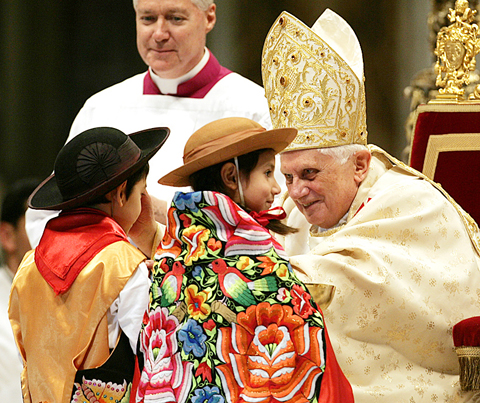Pope Benedict XVI urged an end to “hatred and violence” in the Middle East during his midnight mass Christmas homily ahead of a planned trip to the region.
“Let us pray that peace will be established there, that hatred and violence will cease,” he said in his homily, referring in particular to Bethlehem, the traditional birthplace of Jesus.
Jerusalem’s Latin patriarch said on Monday that the pope would visit the Holy Land in May on his first trip to the region as pontiff.

PHOTO: AP
“With joy we would like to announce to you the desire of His Holiness Pope Benedict XVI to visit the Holy Land as a pilgrim next May,” Fuad Twal, the Catholic leader in the Holy Land, told reporters.
It was the first official confirmation of Benedict’s widely discussed first trip to the region since being elected pope in 2005.
“The supreme pontiff wishes to pray with us and for us, and to acquire a first-hand knowledge of the hard conditions of our region,” Twal said in his Christmas message.
“We are confident in the Lord that this pontifical pilgrimage and pastoral visit will be a blessing for all of us as well as a substantial contribution to better understanding among the various nations of the region, lifting the barriers and helping solve the problems, removing distress and consolidating good relations among people, religions and denominations,” Twal said.
He did not give specific dates.
“We are studying the program with the local authorities,” he said.
Last week the Italian newspaper Il Foglio said the pope would travel to Jordan, Israel and the Palestinian territories from May 8 to May 15.
The head of the Catholic Church in his Christmas homily also spoke of the plight of children “who are denied the love of their parents.”
“Let us think of those street children who do not have the blessing of a family home, of those children who are brutally exploited as soldiers and made instruments of violence, instead of messengers of reconciliation and peace,” he said.
“Let us think of those children who are victims of the industry of pornography and every other appalling form of abuse, and thus are traumatized in the depths of their soul,” he said.
Meanwhile, Israeli Foreign Minister Tzipi Livni traveled to Egypt for talks about rocket fire from the Gaza Strip.
Israel is not prepared to accept a situation of continuous rocket fire on its citizens, Livni said yesterday, hinting that Israel was gearing up to strike at Palestinian militant groups.
She spoke a day after Gazan militias pummeled Israel with more than 80 rockets and mortars.
“Enough is enough,” Livni said in Cairo after meeting Egyptian President Hosni Mubarak.
“We cannot accept this situation, and this situation will change,” she said.

MORE VISITORS: The Tourism Administration said that it is seeing positive prospects in its efforts to expand the tourism market in North America and Europe Taiwan has been ranked as the cheapest place in the world to travel to this year, based on a list recommended by NerdWallet. The San Francisco-based personal finance company said that Taiwan topped the list of 16 nations it chose for budget travelers because US tourists do not need visas and travelers can easily have a good meal for less than US$10. A bus ride in Taipei costs just under US$0.50, while subway rides start at US$0.60, the firm said, adding that public transportation in Taiwan is easy to navigate. The firm also called Taiwan a “food lover’s paradise,” citing inexpensive breakfast stalls

TRADE: A mandatory declaration of origin for manufactured goods bound for the US is to take effect on May 7 to block China from exploiting Taiwan’s trade channels All products manufactured in Taiwan and exported to the US must include a signed declaration of origin starting on May 7, the Bureau of Foreign Trade announced yesterday. US President Donald Trump on April 2 imposed a 32 percent tariff on imports from Taiwan, but one week later announced a 90-day pause on its implementation. However, a universal 10 percent tariff was immediately applied to most imports from around the world. On April 12, the Trump administration further exempted computers, smartphones and semiconductors from the new tariffs. In response, President William Lai’s (賴清德) administration has introduced a series of countermeasures to support affected

CROSS-STRAIT: The vast majority of Taiwanese support maintaining the ‘status quo,’ while concern is rising about Beijing’s influence operations More than eight out of 10 Taiwanese reject Beijing’s “one country, two systems” framework for cross-strait relations, according to a survey released by the Mainland Affairs Council (MAC) on Thursday. The MAC’s latest quarterly survey found that 84.4 percent of respondents opposed Beijing’s “one country, two systems” formula for handling cross-strait relations — a figure consistent with past polling. Over the past three years, opposition to the framework has remained high, ranging from a low of 83.6 percent in April 2023 to a peak of 89.6 percent in April last year. In the most recent poll, 82.5 percent also rejected China’s

PLUGGING HOLES: The amendments would bring the legislation in line with systems found in other countries such as Japan and the US, Legislator Chen Kuan-ting said Democratic Progressive Party (DPP) Legislator Chen Kuan-ting (陳冠廷) has proposed amending national security legislation amid a spate of espionage cases. Potential gaps in security vetting procedures for personnel with access to sensitive information prompted him to propose the amendments, which would introduce changes to Article 14 of the Classified National Security Information Protection Act (國家機密保護法), Chen said yesterday. The proposal, which aims to enhance interagency vetting procedures and reduce the risk of classified information leaks, would establish a comprehensive security clearance system in Taiwan, he said. The amendment would require character and loyalty checks for civil servants and intelligence personnel prior to